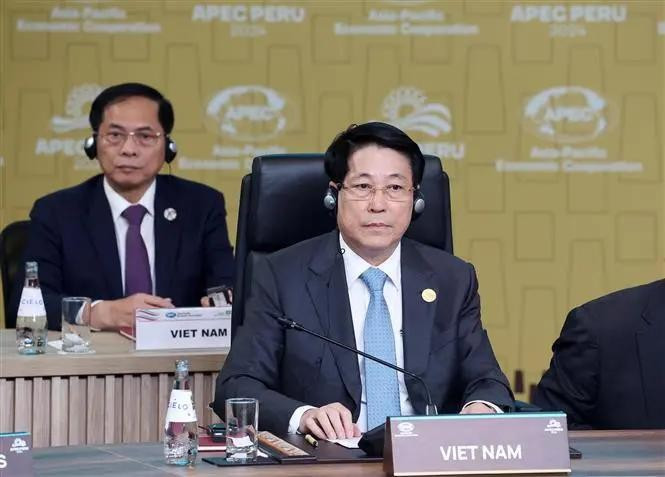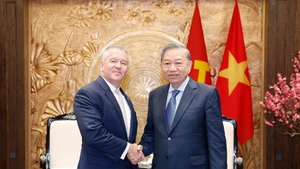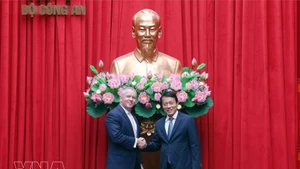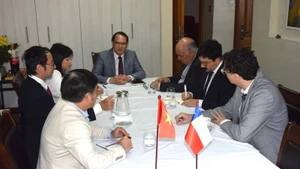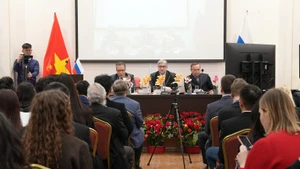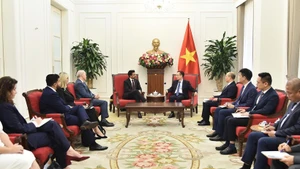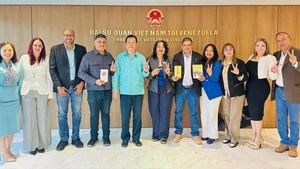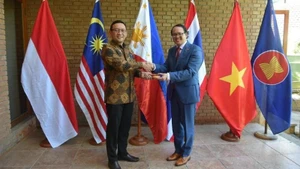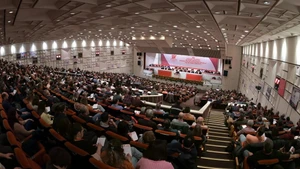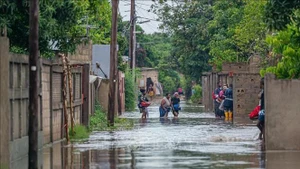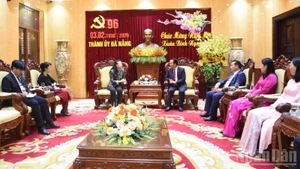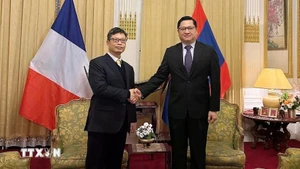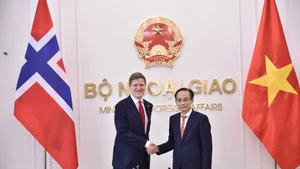This dialogue, held as part of the APEC Leaders’ Week, provided a platform for APEC leaders to exchange information, aimed at strengthening cooperation with partners both within and beyond the region.
It drew leaders and heads of delegations from 21 APEC member economies, alongside representatives from three guest partners - the United Arab Emirates (UAE), the United Nations Food and Agriculture Organisation (FAO), and the Development Bank of Latin American and the Caribbean (CAF).
Cuong expressed strong support for inter-regional cooperation and connectivity, emphasising that it is both an opportunity and an essential requirement for development.
He affirmed that as a leading region in terms of scale, growth rate, and international economic integration, the Asia-Pacific is confidently entering a new era marked with peace, stability, prosperity, sustainability, and inclusivity. However, in an increasingly volatile and challenging world, the region cannot "move forward alone" but must "advance together" with others, Cuong stressed.
To this end, he emphasised three key principles and four main solutions. The three principles include strengthening dialogue, fostering consensus, and maintaining a peaceful environment for development; respecting international law and promoting multilateralism; and ensuring balanced, inclusive, and equitable benefits, with people and businesses at the core.
Meanwhile, the four solutions are implementing selective and phased integration processes, maximising regional advantages and complementarities; improving institutional frameworks and enhancing the efficiency of existing mechanisms; unlocking resources and leveraging the effectiveness of North-South, South-South, and public-private partnerships; and prioritising the development of inter-regional and inter-community bridges, as well as networks for digital transformation, green transition, trade and investment linkages, financial and banking systems, infrastructure, and cultural and people-to-people exchanges.
Cuong affirmed that Vietnam is ready to cooperate with other APEC economies and partners to promote effective inter-regional connectivity that benefits all people and businesses. With its favourable geographical location in Southeast Asia and a modern logistics network, Vietnam is well-positioned to serve as a bridge for expanding trade and fostering inter-regional links, he stated.
By participating in major free trade agreements such as the Comprehensive and Progressive Agreement for Trans-Pacific Partnership (CPTPP), the Regional Comprehensive Economic Partnership (RCEP), and the EU-Vietnam Free Trade Agreement (EVFTA), Vietnam has established itself as a critical link in global value and supply chains. In the coming time, the country will collaborate with other ASEAN members to enhance cooperation between the ASEAN Economic Community and the dynamic, innovative Latin American region, he pledged.
APEC leaders and guests welcomed and highly valued President Cuong's insights and practical proposals.
They highlighted the crucial role of inter-regional economic integration and connectivity in driving economic development and addressing global challenges, and called for enhanced mutual understanding among people from different regions.
Given the current rapid changes in the global landscape, APEC was urged to strengthen collaboration with ASEAN, Africa, Europe, and the Middle East in areas such as digital transformation, green transition, inclusive growth, innovation, and building sustainable supply chains. They also emphasised the complementary benefits between the Free Trade Area of the Asia-Pacific (FTAAP) agenda and other regional free trade agreements.
The same day, Deputy Prime Minister and Minister of Foreign Affairs Bui Thanh Sơn participated in the Dialogue between APEC Leaders and the APEC Business Advisory Council (ABAC).
Under the theme "People. Business. Prosperity", the dialogue focused on solutions to support small- and medium-sized enterprises (SMEs), particularly those led by women. Participants explored strategies and approaches to advancing the establishment of the FTAAP and enhancing cooperation between APEC, ASEAN, the WTO, and other regional frameworks.
ABAC members expressed their hope for more decisive and coordinated actions between the government and the private sector to realise the APEC Putrajaya Vision 2040. ABAC also made recommendations to create breakthroughs in areas such as digital trade, green transformation, mitigating the impacts of inflation, addressing economic growth disparities, combating climate change, and building a transparent, efficient, and business-friendly investment environment.
